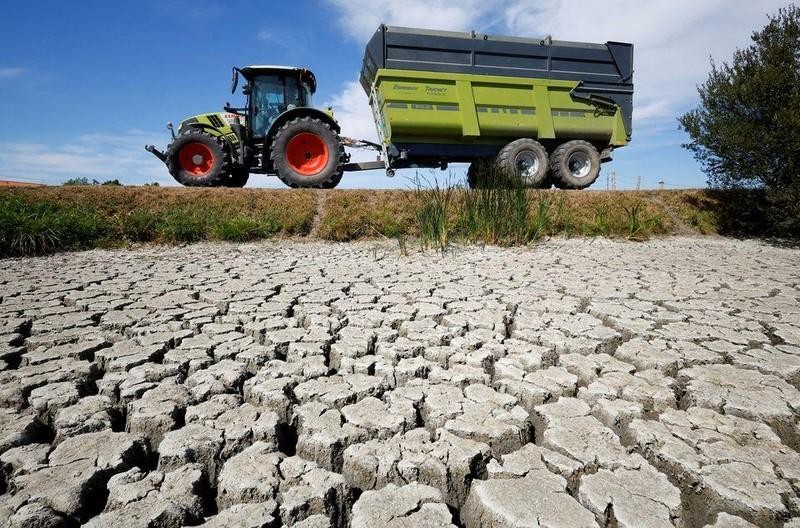In just over a month, the 27th Conference of the Parties to the United Nations Framework Convention on Climate Change (COP27) will take place in Egypt. Amid the rapid and unpredictable climate change, countries are racing against time to turn their climate commitments into real and concrete actions.

A cracked and dry earth at the Marais Breton in Villeneuve-en-Retz, as a historical drought hits France, August 8, 2022. (Photo: Reuters)
Climate change was a prominent topic during the discussions within the framework of the recent 77th session of the UN General Assembly (UNGA 77) in New York, the US.
UN Secretary-General Antonio Guterres also said that the ability to reach the goal of limiting the Earth's temperature to only 1.5 degrees Celsius above pre-industrial levels is very difficult.
The above warnings were announced when a series of intertwined challenges due to COVID-19 pandemic, conflict in Ukraine, inflation, energy crisis and global food insecurity have been making countries difficult to focus on climate goals.
In recent years, extreme weather events have increased in terms of frequency and severity. In 2019, Super Typhoon Dorian swept through the Bahamas, killing dozens of people and causing 3.5 billion USD in damage. Drought raged in Somalia, forcing more than 1.1 million people to flee their homes between January 2021 and August 2022. Europe also experienced an unusual heat wave that led to wildfires and drought.
Extreme weather events occurring on every continent have shown that no country or region, despite being rich or poor, can stay out of the whirlpool of climate change.
The response to a common global challenge requires solutions at the global level. At the 77th Session of UNGA, the UN Secretary-General Antonio Guterres called on rich countries to tax fossil fuel companies, forcing them accountable to the community. The tax money is used to offset the damage that climate change causes to people.
According to a recent study, the Middle East and North Africa regions, which gather many oil refineries, have the worst air quality in the world. Urban residents have to breathe air with pollution levels of 10 times higher than what safe limit according to the World Health Organisation (WHO).
Financial contribution has been a barrier to efforts towards achieving climate goals. At the COP15 in Copenhagen 13 years ago, advanced economies pledged to contribute 100 billion USD per year to help developing countries fight against climate change.
However, the UN Climate Change High-Level Champion for Egypt Mahmoud Mohieldin state that developed countries have not yet fulfilled their commitments although this amount, even if fulfilled, would represent no more than 3 percent of the required climate action financing.
According to an official from the Danish Ministry for Development Cooperation, it is not fair that the poorest people in the world suffer the most from climate change because in reality they are not the main contributors to this problem. Denmark is also the first country in the world to raise funds for supporting the most vulnerable areas to climate change.
Held in Africa, one of the places most vulnerable to natural disasters, COP27 is expected to mark a positive step forward in the fight against global climate change.
However, there is still a gap from expectation to reality, requiring a substantive and drastic sharing of responsibility. The UNGA 77 has not yet reached a breakthrough agreement but has sounded the alarm to urge countries to accelerate action when there is not much time left to prevent the impact of climate change.
|
Climate change remains the most dangerous existential challenge facing our planet and that its repercussions are exacerbating, day after day, as temperature increases.
President of Egypt Abdel Fattah el-Sisi
|
Tu Nam - Translated by NDO